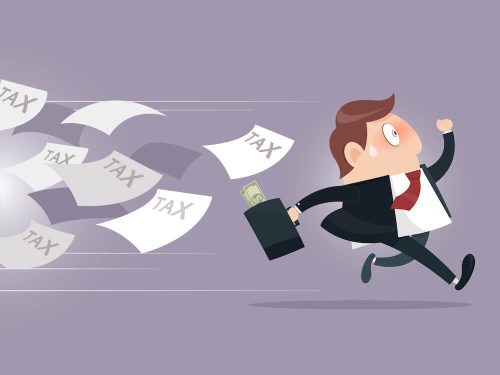Last week we told you about the 2022 World Inequality Report, which outlines in stark detail just how bad income and wealth inequality have gotten around the world. In the US alone, the top 10% of earners now take home 45% of all income, while the bottom 50% takes just 13%. Wealth inequality is even worse, with the top 10% of wealth holders in the US holding 70% of all wealth, as the bottom 50% holds just 1.5%.
These numbers are startling, but they’re not surprising. We live in an economic system that is designed to make the rich richer. There are many things that the authors cite as contributing factors in the gross rise of inequality in the US – deregulation, privatization, and the decline in unions being a few. But one of the most important involves a decline in tax progressivity, as changes to our tax code over the years created laws that allow wealthy individuals and corporations to pay smaller and smaller shares of their assets in taxes.
This week, we are shining a spotlight on some of the ways that wealthy people like us have avoided paying tax and, in turn, fueled the spike in inequality that we see today in the US.
The Great Inheritors: How Three Families Shielded Their Fortunes From Taxes for Generations by Patricia Callahan, James Bandler, Justin Elliott, Doris Burke, and Jeff Ernsthausen
Tax avoidance on the part of the rich is not a recent phenomenon. In their latest investigative tax report, ProPublica analyzes the tax behavior of three of America’s oldest and wealthiest families: the Scripps, Mellon, and Mars families. Over the decades, these families have been able to sustain their huge dynastic fortunes by gaming the tax system in every imaginable (yet legal) way to cut down their tax bills. In a 1937 letter to Congress regarding the tax avoidance behavior of these and other families, FDR wrote: “Taxes are what we pay for civilized society. Too many individuals, however, want the civilization at a discount.” His words unfortunately still ring true today as much as they did back in the early 20th century.
Biden can’t pay for his ‘Build Back Better’ plan by going after tax cheats by Bradley Schiller
One of the ways that President Biden hopes to raise revenue for his Build Back Better agenda is to increase funding for the IRS. The hope is that, with better funding, the IRS would be better equipped to go after wealthy Americans who are illegally evading taxes. We certainly welcome this initiative, but Congress will need to go much further than this in order to make rich people like us start paying our fair share in taxes. Congress needs to tackle not just tax evasion but also tax avoidance – i.e. the perfectly legal ways in which the wealthy take advantage of tax loopholes, exemptions, deductions, and more to lower their tax bills. We need to fundamentally restructure our tax system and get rid of special benefits for the wealthy in order to win the fight for tax fairness.
This tax loophole costs $180bn a decade. Why won’t Democrats close it? by Robert Reich
Some of the wealthiest Americans avoid paying their fair share through the carried interest loophole, which gives ultra-wealthy hedge fund and private equity managers a tax break by allowing them to classify their earnings as capital gains rather than ordinary income. Closing this single loophole would bring in a whopping $180 billion over 10 years. So why won’t Democrats close it, especially with the unique political opportunity that they have now with the Build Back Better Act? Sadly, it’s because the wealthy private equity managers who benefit from the loophole have lots of money to throw at Democrats in Congress. Their champions, most notably Senator Sinema, are standing in the way of real reform.
Time faces criticism for making Elon Musk ‘person of the year’ by Mychael Schnell
On Monday, Time Magazine named Elon Musk – Tesla and SpaceX CEO and richest person in the world – as its “Person of the Year” for 2021. The magazine is now facing criticism for this decision, with some progressive lawmakers highlighting Musk’s tax avoidance as reason enough for him not to grace the magazine’s front cover. They are right about his tax behavior: as recently as 2018, Elon Musk paid nothing in federal income taxes as he took advantage of every imaginable, yet perfectly legal, tax benefit at his disposal. It’s obviously problematic for magazines like Time to glorify tax avoiders like Elon Musk, but the issue is bigger than one very annoying billionaire. The real problem at hand is the tax code that allows wealthy people like him to entirely avoid paying for the societal infrastructure that makes their financial success possible.
